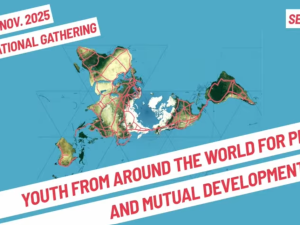den 29. september 2018

Lyd (engelsk med fransk oversættelse):
Rapport fra Frankrig:
LaRouche co-thinker Solidarité & Progrès party day a success
During the weekend of Sept. 28-30, Jacques Cheminade’s Solidarité & Progrès
held its yearly General Assembly in Paris, an event which we have
transformed in a few years into a three-day education and action
process: 1) the party congress formalities rapidly, 2) a full day
of presentations on the most urgent questions for the nation, and
3) a morning of market areas and street deployments for all the
participants.
Some 130 persons participated this year, coming from
throughout the country: Finistère, Montpellier, Ardèche,
Strasbourg, Bordeaux, Lille, Rennes, and other areas. Thirty of
them deployed on Sunday to the market places in the Paris area
and some of the more shy sympathizers ended up getting the most
contacts. The deployment teams distributed an excellent leaflet,
on one side warning of the crash, calling for a new Bretton Woods
organized by the four powers, and denouncing the danger of war,
and on the other side proposing a Rooseveltian policy to create 5
million jobs in France.
Tom Gillesberg, chairman of the Schiller Institute in
Denmark, was our special guest this year from a sister
organization abroad….
Tom Gillesberg first thanked
Solidarité & Progrès for its presidential campaigns, a beacon of
hope for all of us, because we were able to defend our ideas at
the highest levels in an important country of the EU, even
though, like in Denmark, those electoral battles are not really
based on the principle of equality. Those battles oppose
candidates of the same elite, and those who are not part of that
are treated like shadow movements.
In Denmark, he said, even though we don’t have the resources
of the large parties, we defend the ideas and the visions that
others don’t have, thus creating a reservoir of true alternatives
which at a certain point in the crisis will play a decisive role.
Tom then proceeded to show the series of effective posters
they have been issuing in Denmark for local or national
elections. This is the way by which the population has come to
know us, since most people have never read about us in the media.
The only way journalists are allowed to talk about us, is by
criticizing our posters, which, allegedly, nobody can understand.
Who can dare say they are incomprehensible? In 2005: “When
the Bubble Bursts: New Bretton Woods,” in 2009 “Economic
Collapse, Only a New Credit System Can Save Denmark,” in 2015:
“Win-Win with the BRICS: Neither Collapse, Nor War.” But it’s
their 2007 poster, published before the bubble burst that became
quite famous: “After the Crash, Build a Maglev over the
Kattegat.” Many were asking Tom, how did you know it would
burst?
The Danish Schiller Institute participation in the 2019
elections next June is absolutely necessary, since the current
debate is no better or any different than the one in France:
Competition to see who will be stricter against immigrants; who
will be greener than the other, and where will most taxes be cut,
for the rich, or in the health care.
The huge scandal rocking the Dansk Bank at this point,
however, creates an opening to relaunch the Glass-Steagall
campaign. The existence of a EU200 billion dirty money laundering
operation of Russian oligarchs between the Estonian branch and
the Danske Bank has been known since 2006, but it’s only the FBI
campaign against Russia that has brought it to light at this
point. The scandal and the state of bankruptcy of Danske is very
real, but since 30% of all accounts in Denmark, plus the majority
of the public payments, all go through Danske, any attempt to
blow it up, said Tom, would lead to a Danish revolt against the
Anglo-American masters, something which they would want to avoid.
On French issues, Tom Gillesberg debunked the idea
circulated by Macron in France, that the “flexi-security” model
of unemployment payments in Denmark is the most socially
advanced. The system worked back in the 1970s, said Tom, but
since the early ’90s, “security” for the unemployed has totally
been gutted, and the only thingthat has been reinforced in the
crisis is the flexibility to hire and to fire workers.
Finally, if Tom does not believe Denmark is ready to lead
the way for a big change in Europe, because there is still
relative prosperity still in the country, he concluded by calling
for some help from France, to move things in Denmark, and from
Italy, where the attempt to muzzle the Italian opposition to the
EU austerity policies has not been successful and the Italian
government is moving towards China….







